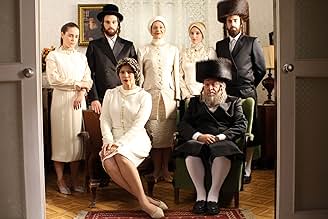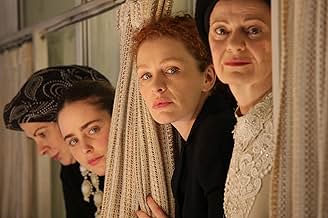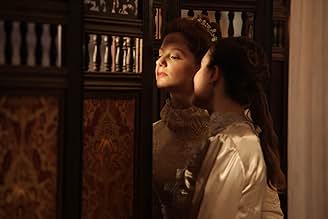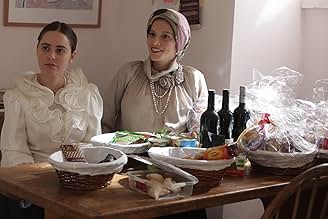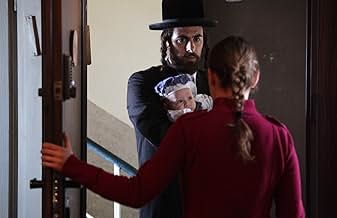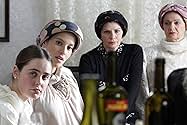AVALIAÇÃO DA IMDb
6,7/10
4 mil
SUA AVALIAÇÃO
Adicionar um enredo no seu idiomaWhen the older sister of Shira, an 18-year-old Hasidic Israeli, dies suddenly in childbirth, Shira must decide if she can and should marry her widowed brother-in-law, which also generates te... Ler tudoWhen the older sister of Shira, an 18-year-old Hasidic Israeli, dies suddenly in childbirth, Shira must decide if she can and should marry her widowed brother-in-law, which also generates tensions within her extended family.When the older sister of Shira, an 18-year-old Hasidic Israeli, dies suddenly in childbirth, Shira must decide if she can and should marry her widowed brother-in-law, which also generates tensions within her extended family.
- Prêmios
- 14 vitórias e 16 indicações no total
Avaliações em destaque
Set in an orthodox Hasidic Jewish community in Tel Aviv, FILL THE VOID centers around eighteen-year-old Shira's (Haldas Yaron), decision about whether to marry widower Yochay (Yiftach Klein) or not. Yochay was already married to her sister Esther (Renana Raz), but sadly Esther passed away during childbirth. The title sums up the film's principal theme: by following her family's fishes, Shira will fill the void created by Esther's passing, and hence become a good mother to Esther and Yochay's newly-born son Mordecai. Morally speaking, she believes she is doing the right thing by accepting Yochay's offer, but director Rama Burshtein asks us to reflect on whether the decision will fill the void in Shira's life, or simply deepen it. Issues of love never seem to enter Shira's mind; she believes she is obliged to marry, and hence works hard to persuade the rabbi (Melech Thal) to sanction her decision. The film is tightly constructed as a series of close-ups and two-shots: the camera gives us a unique insight into Shira's turbulent state of mind, as she sits opposite Yochay, her head bowed, her lip quivering as she tries her best to maintain a facade of calm. Her family offer her a limited amount of support, but it's clear that they are forcing her into marriage. The only way she can obtain succor is to pray to God: in one sequence she is photographed from above, her eyes staring into the camera, as she tries to listen to His word. The ending is quite achingly poignant; in her wedding dress, Shira looks stunningly beautiful, but she cannot sit still. Her body repeatedly rocks from left to right, almost as if she is trying to lull herself into a trance- like state to cope with her forthcoming ordeal. Burshtein cuts to the wedding ceremony, where her head is covered with a white sheet; she is quite literally blinded to what follows, while the families celebrate. The film ends with the now-married couple alone after the ceremony has concluded. They stand at either end of the room and Shira stares blankly into space, underlining the irony inherent in the film's title. A low-key film, but totally compelling nonetheless.
As a watcher of many movies I often find myself bored at watching the same tired clichés recycled over and over and packaged as original movies.
Thats why i was refreshed to watch this movie- a film that has an original story and gives us a look at a different world.
I found the casting to be excellent. The male lead was strong & handsome and inhabited his role with controlled emotion and dignity. The female lead was beautiful in an innocent way and her demure manner and emotional expressions were well suited for her role.
Well done & thanks for a good film experience!
Thats why i was refreshed to watch this movie- a film that has an original story and gives us a look at a different world.
I found the casting to be excellent. The male lead was strong & handsome and inhabited his role with controlled emotion and dignity. The female lead was beautiful in an innocent way and her demure manner and emotional expressions were well suited for her role.
Well done & thanks for a good film experience!
10clg238
This is a gorgeous film. The cinematography, largely revealing closeups of the characters, is stunning, bringing us close in to an unfamiliar world, an insular, deeply religious culture. The acting is flawless. But what brings me to give this film a top rating is the story, one of moral complexity--life, after all, is complicated, a truism that Hollywood films fail miserably in addressing, the rare times they attempt to do so (perhaps "The Master" and "Doubt" are exceptions). A young, innocent woman desires to make a marriage match that is in accordance with her Jewish Orthodox tradition and yet in some ineffable way is personally to her taste. At first this seems possible, but unforeseen circumstances make her choice of marriage partner difficult. She is not just choosing for herself and potential partner but her choice is central to the happiness or unhappiness of relatives and friends—a situation of which she is acutely aware. How can she make the right choice for everyone, herself included? In a culture seeped in moral values, the moral answer to her dilemma is not an easy one. It has been a long time since I've been so deeply moved by a film.
Put aside what you think you know or don't know about the inner world of an orthodox Chassidic community in Tel Aviv, and let Rama Burshtein weave a story that is believable, engrossing, and rich with nuance and subtlety... the timeless themes found in a community which lives in the past, the excellent acting, direction and casting, will have you quickly absorbed in this terrific film.
If you are looking to vent your critique or holier than thou judgments of Jewish Orthodoxy, you may feel a bit humbled by the humanity found behind the long dresses, black robes and covered heads. The portrayal of the rabbi is an especially tender reflection of some one who is indeed spiritual, in the most human sense.
If you are looking to vent your critique or holier than thou judgments of Jewish Orthodoxy, you may feel a bit humbled by the humanity found behind the long dresses, black robes and covered heads. The portrayal of the rabbi is an especially tender reflection of some one who is indeed spiritual, in the most human sense.
Over the last dozen or so years, no less than seven films have been made about the orthodox religious community in Israel. These films are:
Forbidden Love (1999); Kadosh (1999); Bat Kol (Inner Voice) (2002); Ushpizin (2004); My Father, My Lord (2007); The Secrets (2007); Eyes Wide Open (2009).
All these films were made by non-religious or at least non-orthodox film makers, and then along came Fill the Void. Its director and scriptwriter, Rama Burshtein, is an orthodox woman who is also a film maker.
Which raises the question whether this new film is more authentic than the previous ones, whether it portrays the orthodox community more faithfully. It should be understood that the orthodox communities in Israel are tightly-knit units, abhorring the outside, modern Western way of life which they perceive as decadent, immoral and corruptive. They still dress as did their ancestors in the Shtetl in Eastern Europe centuries ago, talk mostly Yiddish among themselves and of course, inter-marry only within their milieu.
Fill the Void is indeed about this latter issue, the question of marriage. The questions raised by the protagonists may seem quaint and even amusing to us, but seem of paramount importance to them, as if no other issues occupy their closed life.
This reviewer has no way of assessing the veracity of the facts and can only rely on subjective impressions. The film "rings true", feels true, and the fact that some of the actors come from a religious background adds to the feeling. Viewers might sneer at the seemingly irrelevant questions facing those "strange" people, but the acting convincingly conveys the sentiment that we are indeed dealing with a grave situation.
I came out of the theater thinking not about the heroine, blandly played by Hila Feldman, or about the way she handles her private demons and dilemmas, but about the strange, foreign, incomprehensible community living not a mile away from my house in the same city, yet separated from me by an unbridgeable chasm.
A disturbing movie.
Forbidden Love (1999); Kadosh (1999); Bat Kol (Inner Voice) (2002); Ushpizin (2004); My Father, My Lord (2007); The Secrets (2007); Eyes Wide Open (2009).
All these films were made by non-religious or at least non-orthodox film makers, and then along came Fill the Void. Its director and scriptwriter, Rama Burshtein, is an orthodox woman who is also a film maker.
Which raises the question whether this new film is more authentic than the previous ones, whether it portrays the orthodox community more faithfully. It should be understood that the orthodox communities in Israel are tightly-knit units, abhorring the outside, modern Western way of life which they perceive as decadent, immoral and corruptive. They still dress as did their ancestors in the Shtetl in Eastern Europe centuries ago, talk mostly Yiddish among themselves and of course, inter-marry only within their milieu.
Fill the Void is indeed about this latter issue, the question of marriage. The questions raised by the protagonists may seem quaint and even amusing to us, but seem of paramount importance to them, as if no other issues occupy their closed life.
This reviewer has no way of assessing the veracity of the facts and can only rely on subjective impressions. The film "rings true", feels true, and the fact that some of the actors come from a religious background adds to the feeling. Viewers might sneer at the seemingly irrelevant questions facing those "strange" people, but the acting convincingly conveys the sentiment that we are indeed dealing with a grave situation.
I came out of the theater thinking not about the heroine, blandly played by Hila Feldman, or about the way she handles her private demons and dilemmas, but about the strange, foreign, incomprehensible community living not a mile away from my house in the same city, yet separated from me by an unbridgeable chasm.
A disturbing movie.
Você sabia?
- CuriosidadesHadas Yaron had to lie to get out of her military duty to audition for the film.
- ConexõesFeatured in At the Movies: Venice Film Festival 2012 (2012)
- Trilhas sonorasIm Eshkachech Yerushalayim
(uncredited)
Principais escolhas
Faça login para avaliar e ver a lista de recomendações personalizadas
- How long is Fill the Void?Fornecido pela Alexa
Detalhes
Bilheteria
- Faturamento bruto nos EUA e Canadá
- US$ 1.775.316
- Fim de semana de estreia nos EUA e Canadá
- US$ 59.164
- 26 de mai. de 2013
- Faturamento bruto mundial
- US$ 3.197.615
- Tempo de duração1 hora 30 minutos
- Cor
- Mixagem de som
- Proporção
- 2.35 : 1
Contribua para esta página
Sugerir uma alteração ou adicionar conteúdo ausente

Principal brecha
By what name was Preenchendo o Vazio (2012) officially released in India in English?
Responda






